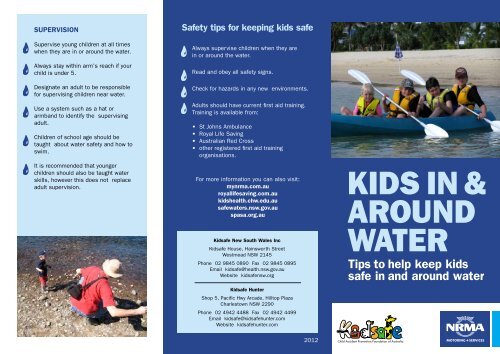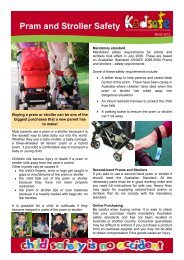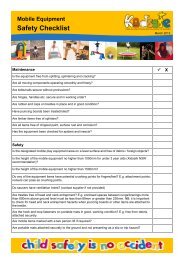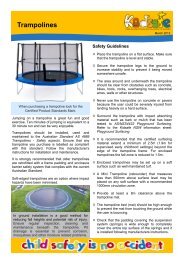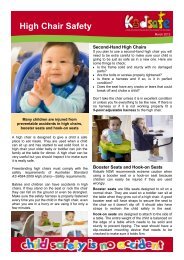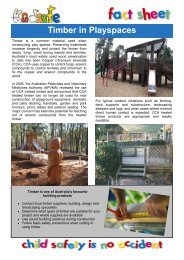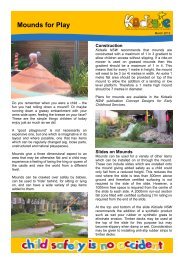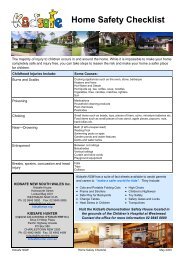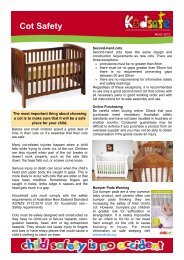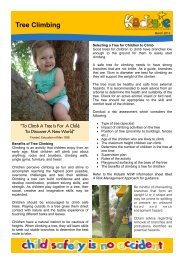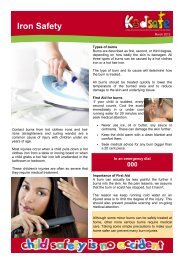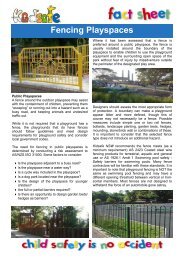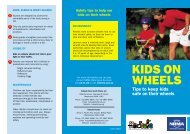Kids in & Around Water - Kidsafe NSW
Kids in & Around Water - Kidsafe NSW
Kids in & Around Water - Kidsafe NSW
Create successful ePaper yourself
Turn your PDF publications into a flip-book with our unique Google optimized e-Paper software.
SUPERVISION<br />
Supervise young children at all times<br />
when they are <strong>in</strong> or around the water.<br />
Always stay with<strong>in</strong> arm’s reach if your<br />
child is under 5.<br />
Designate an adult to be responsible<br />
for supervis<strong>in</strong>g children near water.<br />
Use a system such as a hat or<br />
armband to identify the supervis<strong>in</strong>g<br />
adult.<br />
Children of school age should be<br />
taught about water safety and how to<br />
swim.<br />
It is recommended that younger<br />
children should also be taught water<br />
skills, however this does not replace<br />
adult supervision.<br />
Safety tips for keep<strong>in</strong>g kids safe<br />
Always supervise children when they are<br />
<strong>in</strong> or around the water.<br />
Read and obey all safety signs.<br />
Check for hazards <strong>in</strong> any new environments.<br />
Adults should have current first aid tra<strong>in</strong><strong>in</strong>g.<br />
Tra<strong>in</strong><strong>in</strong>g is available from:<br />
• St Johns Ambulance<br />
• Royal Life Sav<strong>in</strong>g<br />
• Australian Red Cross<br />
• other registered first aid tra<strong>in</strong><strong>in</strong>g<br />
organisations.<br />
For more <strong>in</strong>formation you can also visit:<br />
mynrma.com.au<br />
royallifesav<strong>in</strong>g.com.au<br />
kidshealth.chw.edu.au<br />
safewaters.nsw.gov.au<br />
spasa.org.au<br />
<strong>Kids</strong>afe New South Wales Inc<br />
<strong>Kids</strong>afe House, Ha<strong>in</strong>sworth Street<br />
Westmead <strong>NSW</strong> 2145<br />
Phone 02 9845 0890 Fax 02 9845 0895<br />
Email kidsafe@health.nsw.gov.au<br />
Website kidsafensw.org<br />
KIDS IN &<br />
AROUND<br />
WATER<br />
Tips to help keep kids<br />
safe <strong>in</strong> and around water<br />
<strong>Kids</strong>afe Hunter<br />
Shop 5, Pacific Hwy Arcade, Hilltop Plaza<br />
Charlestown <strong>NSW</strong> 2290<br />
Phone 02 4942 4488 Fax 02 4942 4499<br />
Email kidsafe@kidsafehunter.com<br />
Website kidsafehunter.com<br />
2012
WATER SAFETY<br />
In Australia we have access to a wonderful<br />
variety of water environments for our<br />
recreational activities. These <strong>in</strong>clude the<br />
ocean, rivers, lakes, creeks, pools and spas.<br />
These environments, however, can be<br />
dangerous to children. Tragically, children<br />
represent the most vulnerable group <strong>in</strong><br />
relation to drown<strong>in</strong>g, particularly those under<br />
5 years of age.<br />
Most water-related accidents can be avoided<br />
by follow<strong>in</strong>g a few simple safety tips.<br />
IN AND AROUND PUBLIC POOLS & SPAS<br />
All gates to swimm<strong>in</strong>g pool areas should<br />
always be kept closed.<br />
Keep older children <strong>in</strong> sight at all times.<br />
Public pool areas can be very busy.<br />
Younger children should be with<strong>in</strong> arm’s<br />
reach.<br />
Be aware toys and other float<strong>in</strong>g<br />
devices can obscure your view.<br />
If you leave the pool or water area, even<br />
for a moment, take the children with you.<br />
Always check the temperature of the spa<br />
before children get <strong>in</strong>.<br />
Children should not put their head under<br />
the water <strong>in</strong> a spa as this could <strong>in</strong>crease<br />
the risk of entrapment <strong>in</strong> the suction<br />
outlets.<br />
Tie your child’s hair back <strong>in</strong> pools and<br />
spas to avoid entrapment.<br />
ON RIVERS AND LAKES<br />
Be careful not to stand on an overhang<strong>in</strong>g<br />
bank.<br />
Check the current before lett<strong>in</strong>g children<br />
enter the water.<br />
Do not let children dive <strong>in</strong>to a river or a lake.<br />
Enter cold water slowly.<br />
Avoid swimm<strong>in</strong>g near boat ramps or <strong>in</strong><br />
boat<strong>in</strong>g areas.<br />
FISHING AND BOATING<br />
Always choose a safe spot for children to<br />
fish.<br />
Ensure children wear appropriate cloth<strong>in</strong>g<br />
and footwear.<br />
Check that any fish<strong>in</strong>g equipment is<br />
suitable for the child’s age and size.<br />
If children are <strong>in</strong> a boat ensure they wear<br />
a lifejacket at all times.<br />
Lifejackets should be fastened correctly<br />
and be appropriate for the child’s size and<br />
weight.<br />
The lifejacket should keep the child’s head<br />
above the water and the child’s ch<strong>in</strong> or<br />
ears should not slip through the neck of<br />
the lifejacket.<br />
Give children appropriate tasks on boats to<br />
get them <strong>in</strong>volved and teach them skills.<br />
Set safety rules for children on and around<br />
boats.<br />
CAMPING OR CARAVANNING<br />
Many camp grounds are located near<br />
natural bodies of water such as lakes, rivers<br />
and creeks.<br />
Campgrounds may even feature man-made<br />
swimm<strong>in</strong>g pools and water parks. However,<br />
even a little water can pose a safety hazard.<br />
Set the campsite or caravan as far away<br />
from the water as possible.<br />
Ensure there is adult supervision. Resist<br />
the temptation to allow children to run<br />
freely.<br />
Check water conditions regularly as<br />
these can change quickly, particularly<br />
after ra<strong>in</strong>.<br />
AT THE BEACH<br />
Always swim with children at a beach<br />
supervised by lifeguards or patrolled<br />
by lifesavers.<br />
Swim between the red and yellow flags.<br />
They mark the safest areas to swim.<br />
If you are unsure of conditions, ask a<br />
lifesaver before lett<strong>in</strong>g children <strong>in</strong> the<br />
water.<br />
Keep an eye on the weather, waves and<br />
currents.<br />
Take children to the rock pool to swim,<br />
paddle or just explore. Rock pools<br />
provide an enclosed, shallow area away<br />
from the surf.


